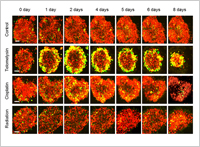Enlarge Image
A genetically engineered telomerase-specific oncolytic adenovirus "Telomelysin" eliminates quiescent human cancer stem cells by promoting their cell cycle entry
Growing evidence suggests that small subpopulations of human cancer cells—termed cancer stem cells (CSCs) or tumor initiating cells—are responsible for tumor recurrence. Since chemotherapy and radiotherapy selectively target proliferating cancer cells, quiescent CSCs are resistant against these DNA-damaging modalities. Mobilization of quiescent CSCs is known to sensitize them to cell death signals. Since adenoviruses interact with the cell cycle machinery as part of their replication, Toshiyoshi Fujiwara (Prof. of Okayama U.) and colleagues explored the use of an engineered telomerase-specific oncolytic adenovirus to kill CSCs from human gastric cancers, which they hypothesized might be more effective compared to conventional therapies.
They established CD133+ CSCs from human gastric cancer MKN45 and MKN7 cells and confirmed their stemness properties. They have previously constructed an attenuated adenovirus 5 vector (Telomelysin, OBP-301), in which the telomerase promoter element drives expression of E1 genes, which are responsible for viral replication. Fluorescent ubiquitination cell cycle indicator (FUCCI) system demonstrated that Telomelysin induced cell cycle mobilization from G0/G1 to S/G2/M phase and subsequent cell death in quiescent CD133+ CSCs by mobilizing cell-cycle related proteins. FUCCI also enabled three-dimensional visualization of the cell cycle behavior in tumor spheres showed that CD133+ CSCs maintained stemness by remaining in G0/G1 phase. They demonstrated that Telomelysin mobilized quiescent CSCs in tumor spheres and xenografts into S/G2/M phases where they lost viability and CSC property, and became chemosensitive.
Telomelysin infection is an effective mechanism of cancer cell killing in solid cancer and is potentially a new therapeutic paradigm to eliminate quiescent CSCs. Based on these promising results, they have started a Phase I/II clinical study of Telomelysin with radiotherapy for esophageal cancer. An 82-year-old female was first treated on 29 November 2013, and a total of 12 patients are scheduled to be enrolled in the trials.
Reference:
・Authors: Shuya Yano, Hiroshi Tazawa, Yuuri Hashimoto, Yasuhiro Shirakawa, Shinji Kuroda, Masahiko Nishizaki, Hiroyuki Kishimoto, Futoshi Uno, Takeshi Nagasaka, Yasuo Urata, Shunsuke Kagawa, Robert M. Hoffman, and Toshiyoshi Fujiwara.
・Title of original paper: A genetically engineered oncolytic adenovirus decoys and lethally traps quiescent cancer stem-like cells in S/G2/M phases.
・Journal, volume, pages and year: Clinical Cancer Research 2013 Dec 1;19(23):6495-505.
・Digital Object Identifier (DOI): 10.1158/1078-0432.
・Journal website: http://clincancerres.aacrjournals.org/content/19/23/6495.long
・Affiliations: Department of Gastroenterological Surgery, Okayama University Graduate School of Medicine, Dentistry and Pharmaceutical Sciences.
・Department website: http://www.ges-okayama-u.com/

